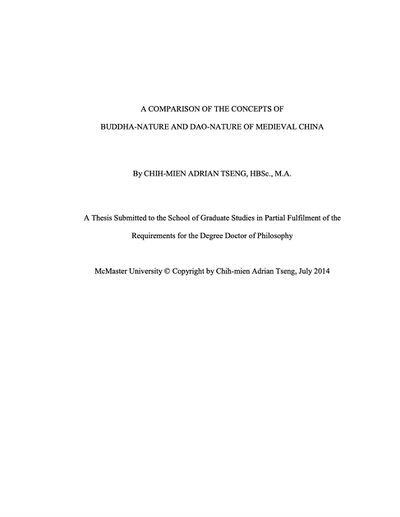- Introduction1
- 1. Discussion of previous scholarship2
- 2. Methods and questions addressed in this project8
- 3. The significance of the idea that insentient things have buddha-nature for
East Asian Buddhism15 - 4. Background: The legitimacy of the idea that insentient things have buddha-
nature in non-Chinese sources17 - 5. The definition of "sentient beings"25
- 6. Chapter summaries32
- Chapter 1: An Examination of the Relationship between Human Nature and the Nature of Inanimate Things in Chinese Thought36
- 1. The discussion of xing 性 in terms of the nature of mind before Xuanxue 玄學
(Arcane Study)38 - 2. The discussion of xing in terms of ontology49
- 2.1 The discussion of xing in terms of Daoist ontology before
Arcane Study49 - 2.2 The discussion of xing in terms of ontology in Arcane Study58
- 2.1 The discussion of xing in terms of Daoist ontology before
- 3. The taxonomy of Daoism81
- 4. Conclusion84
- Chapter 2: A Discussion of Dao-Nature in Practical Daoism87
- 1. The discussion of dao-nature in practical Daoism91
- 1.1 Tao Hongjing's 陶弘景 discussion of dao-nature92
- 1.2 Song Wenming's 宋文明 discussion of dao-nature98
- 1.2.1 The authorship of the Daode yiyuan 道德義淵98
- 1.2.2 Song Wenming's discussion of dao-nature108
- 2. The discussion of dao-nature in the Tang dynasty (618–907 A.D.)114
- 3. Conclusion128
- Chapter 3: A Discussion of Jizang's 吉藏 Argument that Grasses and Trees Have Buddha-Nature130
- 1. Sentient beings: Are they buddha-nature or do they have buddha-nature?136
- 2. Jizang's definition of buddha-nature138
- 3. An examination of Jizang's argument of buddha-nature in an ontological
view157- 3.1 The meaning of the word li 理 (principle) and the method of linei-liwai
理內理外 (within li, beyond li)157 - 3.2 An examination of Jizang's argument that insentient things have
buddha-nature177
- 3.1 The meaning of the word li 理 (principle) and the method of linei-liwai
- 4. A comparison of Jizang's discussion of buddha-nature with the dao-nature of
Daoism182 - 5. Conclusion184
- Chapter 4: An Examination of Zhanran's 湛然 Discussion of Buddha-Nature189
- 1. An examination of Zhanran's argument of insentient things having buddha-
nature195 - 2. Zhanran's definition and interpretation of buddha-nature203
- 2.1 Zhanran's discussion of nature203
- 2.2 Zhanran's definition of buddha-nature205
- 2.3 The relationship between unity and diversity220
- 3. An investigation of Chinese thought in Zhanran's Fuxing 輔行
(止觀輔行傳弘決) and its association with Zhanran's discussion of
buddha-nature223 - 4. Conclusion243
- Conclusion: A Comparison of Buddha-Nature and Dao-Nature247
- Bibliography266

